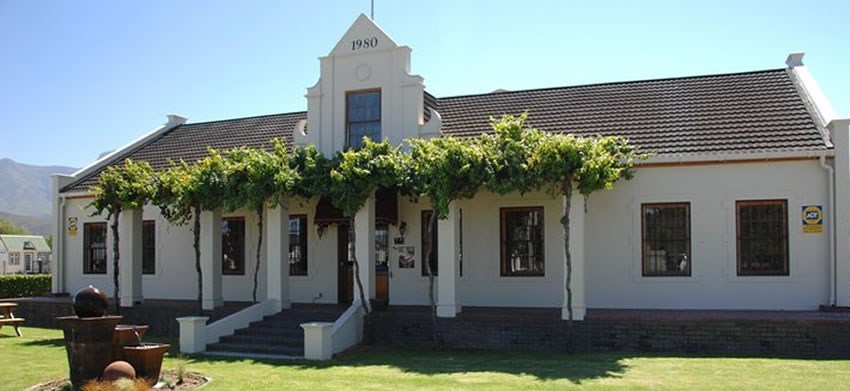
The house is home to Roodezandt RF, a cellar with a long, colourful history. Eleven producers, who had previously delivered their grapes to the Sonskyn Cellar, founded the Sentrale Cooperative Winery Ltd on 18 September 1953. However, this name did not meet the approval of the members and in January 1954 it was changed to Roodezandt Winery. The name Roodezandt refers to “Over Het Roode Zand”, one of the historic farms in the area, on which the town Robertson established in 1853. The gable of the office building is a reproduction of the original “Over Het Roodezand” farmhouse gable.
Since September 2020, the cellar has been known as Roodezandt RF and receives about 45,000 tons of grapes from 40 producers, farming in a radius of about 30 km in the districts of McGregor, Le Chasseur, and Goedemoed.
During an interview with Christie Steytler, production manager of Roodezandt RF, he confirmed that this cellar is a regular participant in the Cellar Assistants’ Programme, as it is considered important that cellar assistants’ knowledge of winemaking procedures is increased. It is to the benefit of all cellars that cellar assistants are equipped with as much knowledge as possible and that they have a passion for their tasks. He believes winemakers should be able to rely on the cellar team because ultimately cellar assistants are an extension of the winemaker.
It is Roodezandt RF’s policy to approach personnel matters with empathy. However, it is realistic that discipline in a cellar is not negotiable, but that mutual respect is the foundation on which healthy relationships are established. Christie emphasized that it is important that management remain aware of the challenges experienced by cellar assistants on a personal level and that management offers support where possible.
It cannot be ignored that cellar assistants often face challenges in terms of training, especially if knowledge transfer is not offered in their mother tongue. It has been established that cellar assistants find the management of their finances difficult, and lack of experience often causes challenges. It is important that cellar assistants’ general knowledge in terms of winemaking procedures is increased and that they are exposed to information that can be applied in the cellar.
Strong mentoring relationships exist in this cellar but there is a realistic approach in terms of the development of cellar assistants on a personal as well as professional level. The development of a potential leader, starting professionally at a junior level who aims for success, is not achieved overnight. Christie confirms that cellar assistants rely on winemakers, who guide the cellar team. Trust is established in this manner and transfer of knowledge occurs naturally and successfully.
According to Christie, it is important that a potential leader is committed to achieving more, but that the individual should also be willing to “go through the ranks”, that is to start at a junior level, which is always a challenge. Roodezandt RF is committed to supporting such an individual but also allowing him to prove himself.
Christie considers it essential that senior cellar assistants’ knowledge and interests are stimulated and increased by attending workshops, such as the Cellar Assistants’ Programme, which confirms their involvement in the industry. Healthy, positive and well-established relationships, as well as good communication, are to the benefit of everyone, not only for the cellar assistants but also for the cellar.